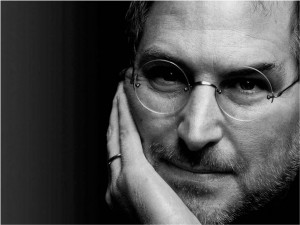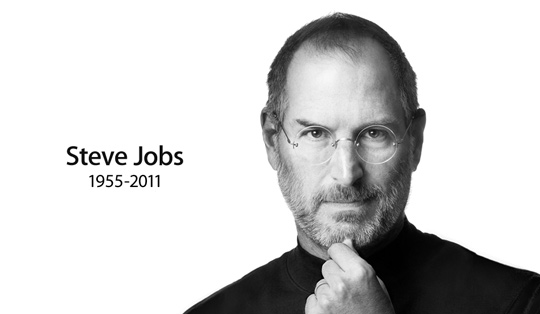
by Casper Daugaard
Steve Jobs wasn’t your average superstar billionaire megalomaniac. He went from college dropout to creator of the most valuable company in the history of the world in less than 30 years. Though, to be fair, Jobs actually spent a third of those years fired from Apple, during which time he co-founded NeXT Computers and Pixar Animation Studios, later sold for a 47,000% profit. The life and mind of this business superstar is told with unparalleled candor and accuracy by Walter Isaacson’s ‘Steve Jobs‘, released shortly after Jobs’ death in October 2011.
Those who pick up Isaacson’s 656-page tome eager for a secret recipe for success that they can study and emulate will likely be disappointed or confused (or both). Drawn to Jobs’ rockstar persona, meteoric career and Midas Touch, it would be all too easy for hopeful entrepreneurs to see him as an example to be followed. Perhaps they should look elsewhere for advice, for The Gospel According To Saint Jobs could be quite controversial and even sinister. Used improperly, it could possibly destroy a person’s career. Indeed, it is likely that Jobs’ business philosophy could only have worked for Jobs himself because they rely on a personality trait combination unique to Jobs and a set of circumstances that are impossible to duplicate.
Nonetheless, I make a bold attempt to distill the 13 imperatives that had the largest impact on the success of Steve Jobs. Read on at your own peril.
When Steve Jobs was a baby, his mother put him up for adoption. Jobs learned of this at an early age, but wasn’t much affected by it until one fateful day in the playground. A playmate in the sandbox informed Steve that being adopted meant he had been abandoned because he was unwanted, an error. Young Steve burst into tears and, devastated, ran home to his (adoptive) parents. They, in turn, offered an alternative view: baby Steve hadn’t been abandoned, but chosen by them because he was special. Steve liked this perspective and decided to combine the two views in his mind. It would come to govern the rest of his life.
Abandoned. Chosen. Special. The painful feeling of abandonment made Jobs crave respect and recognition, and instilled in him a desire to control his destiny and environment for the rest of his life. Being chosen because he was special gave him the belief that he was just that: special. Consequently, normal rules did not apply to him. This belief manifested itself in myriad ways. Jobs would often speed, park in handicap spots and, for a long time, refused treatment for his cancer tumor because he thought he could ‘will’ it away. This sense of fearlessness was a chief cause of Jobs and Apple’s successes.
There are countless examples of people who have narrowly evaded death, escaped from a great deal of trouble, or suffered a traumatic childhood, and used such experiences to their advantage. Instead of letting the trauma leave them paranoid or destroyed, they have used it to fuel their inner flames and become intense and relentless. Steve Jobs is no exception.
Steve Jobs’ fascinating feeling of being special was the cornerstone of one of the most intriguing and powerful keys to his business success: his reality distortion field, an ability to make others (and, importantly, himself) believe almost anything. Jobs’ RDF manifested itself everywhere. In meetings, Jobs could persuade a team that a project they thought would take a year to complete could be done in two weeks (and, consequently, it was). Most notably, Jobs’ RDF could be experienced at each and every one of the almost mythical keynote speeches that Jobs would deliver when introducing the next Apple product, often leaving the crowds sweep with hysteria.
Jobs was said to have learned reality distortion from his spiritual guru, Robert Friedland, who was accused of being a con artist but later became a billionaire in natural gas. Steve’s RDF was said to consist of an intricate mix of charm, charisma, bravado, mystique, hyperbole (Steve would often purposefully overstate or lie about facts to motivate people), insistence and persistence. All traits and techniques often employed by leaders of cults and religious movements.
Charisma is actually Greek for “given by the gods.” According to strategist Robert Greene, charisma – unlike charm — is said to be difficult to define, and almost impossible to learn or acquire as a trait. It is something you have to be born with, a fire in your eyes. Steve Jobs, who was shy, awkward and self-effacing as a young man, made himself an exception to this rule. He carefully crafted one of the most compelling cases of charisma powerful enough to distort reality, and he made it a key source of his power. He became someone who could walk into a room, construct his own reality and project it onto those around him. His take-charge attitude combined with the high-wattage aura he projected made people notice him wherever he went. Can you do the same?
3. Surround Yourself with Only the Best
In spite of his volatile and controversial personality, Steve Jobs possessed the valuable trait of being a master networker. Examples abound of countless famous people who wanted to associate with and be near him. Al Gore serves on Apple board of directors. Mark Zuckerberg and both founders of Google consider Jobs a mentor. Legendary musicians Bob Dylan and Bono worked with him to promote iTunes. Bill Clinton often stayed with Jobs in Palo Alto (he once called him late at night to ask advice on the scandalous Lewinsky sex affair!). And in 2010, President Obama requested an audience with a sick and frail Jobs to ask him advice on education and job creation in America. No big deal.
 The fact that Jobs was so well-connected and respected serves to show a strict principle he lived by: for good and bad, people infect each other with their attitudes and talents (a claim supported by cool, recent research of mirror neurons). You must surround yourself with only the best people, which Jobs would refer to as ‘A Players’. ‘Lesser’ people will drag you down. He was not reluctant to employ this elitist principle at Apple:there would often be firing rounds to rid the company of B and C Players. Jobs said that he wanted Apple to hire people who were creative, intelligent and a little bit rebellious. Steve said: “You don’t have to baby A Players. And A Players prefer to work with other A Players.”
The fact that Jobs was so well-connected and respected serves to show a strict principle he lived by: for good and bad, people infect each other with their attitudes and talents (a claim supported by cool, recent research of mirror neurons). You must surround yourself with only the best people, which Jobs would refer to as ‘A Players’. ‘Lesser’ people will drag you down. He was not reluctant to employ this elitist principle at Apple:there would often be firing rounds to rid the company of B and C Players. Jobs said that he wanted Apple to hire people who were creative, intelligent and a little bit rebellious. Steve said: “You don’t have to baby A Players. And A Players prefer to work with other A Players.”
Relationship expert Keith Ferrazzi states the most important people to have in your network are mentors who can help you by offering advice and access to their own networks, or by exerting their influence on your behalf. Steve Jobs understood this. In spite of his I-know-better attitude, he actively sought out and recruited advisors and mentors throughout his life. These powerful people would often be intrigued by the young and driven man and go to great lengths to help him become successful. Somehow, they report, Jobs made them feel good about themselves and life.
It is clear that even a “business genius” like Steve Jobs could have achieved very little had it not been for the gifted people (artists, engineers, programmers, spiritual gurus, marketing experts) he asked for help, hired, fired (and sometimes re-hired).
On the tombstone of steel magnate Andrew Carnegie, one of the richest men to have ever lived, is written the words: “Here lies a man who knew how to enlist the services of men better than himself.” Steve Jobs must have stolen that philosophy. Which brings us right to…
4. Steal
It feels right to call Steve Jobs an inventor. A genius. But that might be missing the point ever so slightly. First of all, as we have seen, Jobs’ genius lay in his intuitive consumer empathy and in his way of surrounding himself with specialists and orchestrating their talents to create amazing products. But also, Jobs enjoyed stealing ideas from other people and companies. In fact, one of his favorite quotes was from Picasso: “Good artists copy. Great artists steal – and we (Apple) have always been shameless about stealing great ideas.”
One surprising thing many of the most amazing companies in the world have in common is that they were rarely the inventors of their own service. Google was the fourth (!) major search engine to launch. Amazon was not the first online bookstore. eBay was not the first auction site (far from, actually). Facebook, Disney, Paypal… the list of thieves and emulators goes on. Instead of trying to re-invent the wheel, it is often a good idea to let a concept prove itself and see weaknesses emerge before entering a market and dispense a mind-blowingly superior offering. Apple has always understood this because Jobs was a master at identifying markets filled with second-rate products. When the iPod was launched in 2001 and “revolutionized the music industry”, MP3 players had been around for years. The first iPhone was unveiled in 2007, almost a decade (!) after the first smartphone hit the market. Many e-readers were in existence when the iPad arrived.
Jobs was not afraid to admit that his artistry mainly consisted of standing on the shoulders of giants, like Newton, and building on the work of others. Author Malcolm Gladwell says Jobs was more of a “tweaker” than an inventor. I think he was right.
So go steal other people’s work and ideas and improve them. It’s OK. You might want to hire a lawyer too.
5. Focus
Steve Jobs was a Zen Buddhist. Through his experimentation with Eastern philosophy and meditation in his youth, he learned that “simplicity is the ultimate sophistication”.
A curse for intelligent people is that they often have a wide range of interests and a fear of missing out on opportunities. Steve Jobs knew that to be successful, focus is key. He employed this principle with great rigor at Apple. He would encourage (read: order) his people to only have 2-3 product lines in the making at a time, so focus could be maximized and perfection achieved.
As ‘ultrapreneur’ David Rensin observes: when delivering his reality-distorting keynotes, Jobs would always return to and focus on only the coolest feature of a new product – even if it had several extremely cool features to highlight.
In his personal life, Jobs was a master at eliminating distractions that interfered with his laser-like focus. His usual technique was to ignore a distracting issue, even such matters as a pregnant girlfriend, family trouble or a cancer diagnosis (!) – as if he could will these issues away. When Jobs was ousted from Apple through a board coup in 1985, the vindictive and emotional Jobs quickly realized he had to come to terms with the situation and move on. Only thus would he have the peace of mind and mental energy to focus creating a new company with his wealth and connections.
Focus!
Jobs believed that the customer experience was the most important thing in the world. His goal was to impute Apple’s brand identity of cutting-edge innovation and sleek, Zen-like simplicity into each and every aspect of the products and services offered by the company. He felt other companies failed miserably at doing this. Most people agree that Apple’s brand is imputed (what a weird word) everywhere.
Have you ever turned on an iPhone for the first time? Removed the plastic wrapping from a sleek new MacBook Air and felt the strength of the glue? Listened to the sound of your footsteps on the stone floors in an Apple Store? Seen a huge Apple billboard across Sunset Boulevard in Los Angeles? Then you know what imputation means.
Jobs’ obsession led to a compulsive (and often highly emotional) desire for control and attention to detail. Jobs had the iMac go through hundreds of reviews – driving designers and engineers to the brink of insanity – before he was satisfied with its look and feel. There could be no compromise when it came to the user experience.
Another aspect of the imputation of Apple’s brand was an intriguing sense of mystique surrounding the company and its products. Apple is always very secretive about upcoming products, a strategy that never fails to create speculation and excitement of almost hysterical proportions. As seen with the troublesome “user-proofed” iPhones and their tamperproof screws, once released, Apple products are completely enclosed in casing, their technology hidden from the world and impossible to modify so others cannot, as Jobs would say: “Fuck it all up.”
So, to create products that generate obsessive interests, make sure the essence of your brand – the words or feelings you want people to think of when they hear or see it – exists everywhere in the product experience.
7. Don’t Talk to your Customers
You’ve got to know what people (customers) want. This is less obvious than it sounds. Steve Jobs seemed to have an uncanny intuitive understanding of what people wanted, often before they knew it themselves.
It’s possible to find out what consumers really want through a technique “invented” by entrepreneur guru Steve Blank. It’s called Customer Development. Each year, billions of dollars are wasted on developing “revolutionary” products that no one wants. Customer Development is a risk management strategy businesses use to avoid betting on the wrong products and instead release ones that are in demand. This can happen through research, tests and endless dialogue with potential or existing customers. Customer Development is exciting and, for a boring risk manager like yours truly, probably the best thing since oxygen. It’s fun, too!
One of the most controversial aspects of Steve Jobs was his utter rejection of market research and customer development. If anyone knew what people needed and wanted, it was him. In fact, Jobs believed – perhaps somewhat arrogantly – that people had no idea what they wanted until he showed it to them. What is both interesting and disturbing is that he was right almost every time. Many people had a difficult time imagining what they would do with an iPad other than maybe read books. Until they owned one.
Jobs attributed his product development success to an intuitive capacity for empathy and Apple’s unique focus on the intersection between art and technology.
Refusing to do market research or talk to the customers is probably the least recommended of Jobs’ success strategies. But it seemed to work for him.
So, either be an innovation genius with an uncanny sense of what people want – or start talking to your existing or potential customers as much as you can, right now!
8. Be a Hysterical Tyrant
Jef Raskin, an early Apple employee, said that Steve Jobs would have made “an excellent King of France”. And rightly so. Jobs was an arrogant bully, prone to intimidation tactics and fits of hysteria. He got his first girlfriend pregnant, then denied the child was his. He would scream at his subordinates, belittle waitresses, park in handicap spaces and throw tearful tantrums like a little child when he did not get his way. He could be mesmerizing and charismatic – but also cold and brutal.
The same brilliant empathy he used to push for shorter timelines by motivating his employees, Jobs would use for more sinister purposes: “He had an uncanny capacity to know exactly what your weak point is, know what will make you feel small, to make you cringe,” a close friend (!) reported. Jobs was also known for his ability to stare without blinking to intimidate others, a practice he had perfected as a young man.
As though all this weren’t enough, Jobs also enjoyed a bizarre (and rather hilarious) binary view of the world. If something wasn’t “the best thing ever”, it was a “worthless piece of shit”. Someone was either a hero or a “fucking idiot”. To Jobs, there was no middle ground. Ever. He would often open negotiations by stating the other company’s product or service was complete shit. Then stare at them in silence.
Strangely (or maybe not so much), those business partners or Apple employees who were not broken and destroyed by Jobs’ tyrannical rule report that not only did it make them stronger, it also instilled in them a strong desire to please their boss. They were eager for his respect and affection. This made them work harder and deliver results they had never imagined possible.
The 15th century Florentine strategist Nicollò Machievalli said that, often, it is better for you to be cruel rather than kind, better to be feared rather than loved. Jobs – who cared nothing if people liked him – must have been an avid reader.
So don’t be a nice guy (all the time). They finish first!
As discussed earlier, Steve Jobs desire to ‘impute’ Apple brand or essence into every aspect of the product experience combined with the feelings of helplessness he endured in his childhood, had some serious effects on his attitude and managerial style. Nothing but perfection was good enough for him, and he believed this could only be achieved through control. As a result, he was often accused of obsessive tendencies and micromanagement when it came to product review.
More so than other companies, Apple has always kept a tight leash on its own supply chain, often leading to strained relationships with suppliers. Once, when a supplier had failed to deliver on time, Jobs instructed an Apple executive: “Just tell them if they fuck with us, they’ll never get another fucking dime from this company, ever.”
Full control was the only way that Jobs (and Apple) could deal with his own arrogance and inherent mistrust of others, especially other companies.
One day, to his own shock and horror, Jobs realized that there was one major aspect of the Apple product experience that he had no control over: the experience of buying an Apple product in a store. Full of wrath and determination, Jobs and his people set out to find an immediate solution to this problem. Two years later, the first Apple Store – now an iconic retail chain – opened.
If you want full control like Jobs had, micromanage everything, and keep your employees and suppliers suspended in terror. Alternatively, have some faith in people.
10. Do not Fear Self-cannibalization
This is a slightly tricky one. But very important. As a businessman, Steve Jobs was keenly aware of the “Innovator’s Dilemma” phenomenon, which often makes even great companies fail over time. The Dilemma states that someone who invents something is usually the last person (or company) to realize it when the invention has become antiquated and should be replaced by something new and better. And then, it’s usually too late to catch up with competitors and rivals.
As Jobs and his teams built the fascinating ecosystem of Apple products that has emerged in the past decade, he was never afraid to let Darwinistic evolution do its cruel work. He knew that launching the iPhone would decrease the sales of iPods. He knew the iPad would likely decrease sales of laptops (and iPhones). Products cannibalize each other. But Jobs believed that if you’re unwilling to face reality and let your company “self-cannibalize”, another company will push ahead and consume you. Apple’s fearlessness with innovation has worked wonders for the company again and again, and it probably comes down to the Red Queen hypothesis from evolutionary theory that if you want to stay in the same place, you have to keep running.
So keep running. What can you do to stay ahead of the competition at all times?
11. Break down Silos
Jobs liked to tell anyone who’d listen that he saw Apple as a little rebel pitted against evil empires like Microsoft, Sony and titans of industry. The establishment. As time passed, these ‘evil empires’ would often follow in Apple’s daredevil innovation footsteps, and try and compete with the iPod or iPhone. However, despite their enormous assets and access to talent, the companies would usually fail to ‘impute’ to the same extent and create the same loyalty and enthusiasm amongst customers. Why?
Jobs attributed their failed attempts to the existence of ‘silos’ within the evil empires: separate business divisions (engineering, marketing, strategy) with their own profit-loss structures that couldn’t work well together because they didn’t communicate with each other.
When Jobs was CEO of Pixar (during his 11 year ‘exile’ from Apple), he ordered that their HQ be constructed around a large central atrium. People like Pixar co-founder John Lasseter (who directed Toy Story!) were puzzled at this idea at first, but soon understood its value. “Steve’s theory worked from day one. I kept running into people I hadn’t seen for months. I’ve never seen a building that promoted collaboration and creativity as well as this one.” Lasseter later said. This way, without rigid silos, ideas could flow more freely. Best practices could be exchanged. With one mission shared by all, the whole could become (a lot) more than the sum of its parts.
So when you put together your team, make sure everyone talks to each other as often as possible – even if you have to force them. Only thus can you have innovation so powerful that it will drive the competition crazy.
Jobs delivered one of the most celebrated university commencement speeches in history. It happened at Stanford in 2005. Jobs kept things simple, and told the crowd three stories. One was about the time he got fired from Apple, the company he had founded. And how getting fired was the best thing that ever happened to him.
After Jobs ousted by way of the week-long board coup in March 1985, he was boiling with a desire for revenge and other destructive emotions. Soon, however, he knew he had to move on. And then he realized something different. The firing had been traumatic, but it had relieved him of an uncomfortable “burden of success,” and he was free to see things anew and take inventory of his experiences. To look himself into the eyes and learn from his mistakes, and vow to never make the same mistakes again.
Steve Jobs proves that failure – especially spectacular and traumatic failure like being ousted from your own company under massive media scrutiny – can be excellent for you if you need the change it affects in your personality or attitude. It can also make you stronger, wiser and less worrisome about little things. This was truly beneficial for Jobs, as he let the ousting propel him into the most creative period of his life. He feel in love with a woman and married her, helped found and grow Pixar and sold it to Disney for billions of dollars, then returned triumphantly to Apple, replaced the CEO with himself, and started the decade that would make the company the most valuable in the world.
If you want to succeed spectacularly, you must be ready to fail spectacularly. This is not nonsense. Now go get yourself fired and humiliated!
13. Memento Mori
Now we’re getting serious. One of the most motivating aspects of Steve Jobs’ personality and intensity was his knowledge of a simple fact. The fact that, like all of us, he would soon die. Life is short for everyone, but Jobs always had an intuitive feeling that he would die young (and he turned out to be right). He knew his opportunity to do something meaningful would be while he was still young. To Jobs, this became the greatest motivation of all.
The most crucial reminder of his mortality came when, in the early 2000s, he was diagnosed with cancer and told he was going to die. The cancer was treated, but Apple CEO (then COO) Tim Cook reports that when Jobs returned to work, it was with a fierce energy and hitherto unseen boldness that infected the rest of the company. Fueled by this intensity, Apple launched the grand strategy that would transform computers and media. Apple set out on a wild journey of iPods, Macbooks, iTunes, smartphones and tablets that, in less than a decade, would grow the company from $5 billion in valuation to over $400 (!) billion, the most valuable in the world by market capitalization (stock price x number of stocks).
The wise Roman Emperor Marcus Aurelius wrote in his Stoic journal: “Do not act as if thou wert going to live ten thousand years. Death hangs over thee. While thou livest, while it is in thy power, be good.”
To be honest, knowing you will die soon can be a depressing affair. Aforementioned Robert Greene has said that too many thoughts of inevitable death can crush some people’s spirit completely and paralyze them. “What is the meaning of it all?” they ask, in despair. A fearless approach – the one employed by Steve Jobs – is to stare death in the eye and accept it as given. Instead of fear and depression, an acceptance of death and the brevity of life can instill in you a powerful sense of urgency. Each day, each hour counts. You must act now – with intensity and willpower. And that sets you free. Once you lose your fear of death, what is there left to be afraid of?
This is pretty powerful stuff. So powerful, apparently, that it can help you create the most admired, secretive and valuable company in the world in less than 30 years. Not bad, eh?
THE END (?)
Steve Paul Jobs died at the young age of 56. He was mourned by the whole world, a world he is believed to have transformed in many ways across six or so industries (imagine life without an iPhone or its equivalent). He was a strange man, full of contradictions, obsessions and quirks. His passions, perfectionism, demons, desires, artistry, devilry, eccentricity and obsession for control were integrally connected to his approach to business and the products that resulted. It made him an icon (or iCon).
As I said in the beginning, if we want to learn something from Jobs, it is probably better for most people to be inspired by his intensity and work ethic than to try and emulate his individual personality traits and techniques. These hurt other people a lot, made him countless enemies, and almost ended his career on numerous occasions. But that never bothered Steve Jobs much. As he said to the Stanford students and the world in words (stolen from someone else) that will always be remembered: “Stay hungry. Stay foolish.”
Casper Daugaard, 2013



![logoapple[5]](http://blog.casperdaugaard.com/wp-content/uploads/2011/11/logoapple5-300x300.jpg)







Howdy! This post couldn’t be written any better! Reading this post reminds me of my previous room mate! He always kept chatting about this. I will forward this page to him. Fairly certain he will have a good read. Thanks for sharing!
My partner and I absolutely love your blog and find the majority of your post’s to be exactly I’m looking for. Do you offer guest writers to write content in your case? I wouldn’t mind producing a post or elaborating on many of the subjects you write regarding here. Again, awesome site!
Wow! Thank you! I always wanted to write on my website something like that. Can I include a part of your post to my website?
Discover More Here
Absolutely, anything you want! And thanks a lot for your kind words.
You have brought up a very superb details , appreciate it for the post.